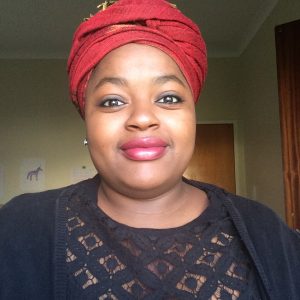 Gugulethu Radebe teaches history at the Diocesan School for Girls in Grahamstown. She presented a workshop on equality and inclusion during our Axis Summit this July. In our conversation below, she speaks about her experiences as a young educator.
Gugulethu Radebe teaches history at the Diocesan School for Girls in Grahamstown. She presented a workshop on equality and inclusion during our Axis Summit this July. In our conversation below, she speaks about her experiences as a young educator.
How did you first get interested in education?
I first got interested in education when I read Half the Sky by Nicholas Kristof and Sheryl WuDunn. It made me conscious of the need to educate girls and empower women through education. I wanted to join the people who helped bring about this change in the lives of young girls.
What is the most challenging thing about being a teacher?
The emotional demands. Before I became a teacher, it never occurred to me that teachers had lives that they sometimes put aside to ensure they are giving the very best to their students. Many people believe teaching is simply delivering a curriculum. But teaching also requires a constant interaction with the personal lives of children. It’s a big deal whether my students are happy and successful. I want to ensure that they are not only gaining information, but also feeling loved and accepted in their learning environment.
What do you wish politicians understood about education and teaching?
Education is not limited to school. Students learn so much from the world around them. And yet what’s missing from many people’s educational experiences is a chance to explore, to experience the world, to leave their comfort zone and ask real questions that matter.
I also wish we would stop measuring student’s success only by their academic results. Success is also about who a person becomes. Their personal learning and maturing also determines whether they have succeeded.
At our Axis Summit, you presented a workshop on creating learning environments where students all have an equal voice. How do we do that?
We need to make our students feel like our classrooms are a safe space. Classrooms need to be spaces where our students embrace their differences, instead of spaces where we pretend like there are no differences. We should give students platforms to discuss all the “elephants in the room.” By having honest dialogue about their life experiences, students will feel noticed and believe that their experiences are valued.
We also should allow our students to have a degree of control over their learning, with gentle guidance from the teacher. We need to encourage students to make mistakes, and to respect the mistakes of others. That also encourages students to speak up and open up.
In your workshop, you spoke about how students often don’t feel a sense of belonging in their school environment. What causes this?
Sometimes, it comes from their traditions. For example, if a school hosts a yearly class trip overseas, that excludes children from less privileged backgrounds. In general, students can often feel forced to conform to the environment of their school. This can cause children to view their differences as a problem. It may make them feel like they need to change who they are to fit in. Once these students reach university, I’ve seen how many end up looking back on their educational experience and feeling angry. They feel like they spent those years compromising who they were.
We should allow student differences to help re-create a school’s culture, instead of simply sticking to the traditions we’ve always had.
What are your dreams for the students you teach?
I want my students to understand that they have a voice and should not be afraid to use it. I want my students to be able to question and challenge the norms of society. I want my students to be empathetic and willing to make a difference. I want them to be problem solvers, not just another person who is aware of all the things going wrong with the world. I want my students to own their thinking and actions and, as a result, be the best version of themselves.
